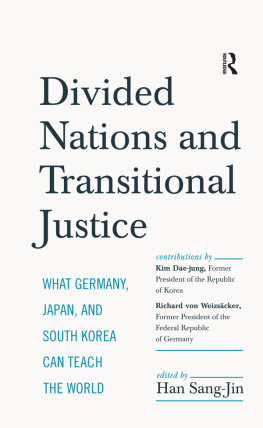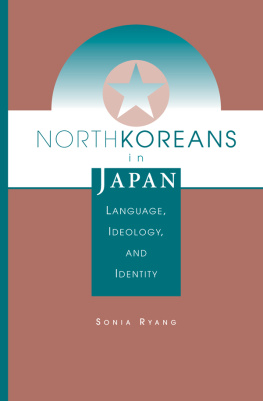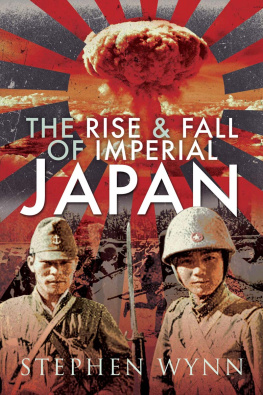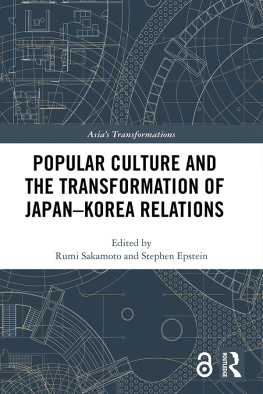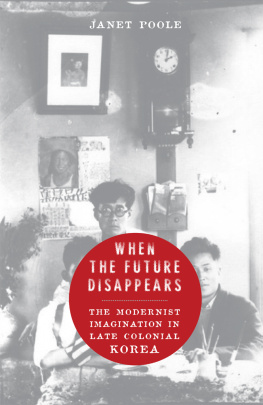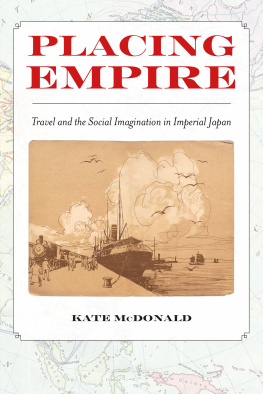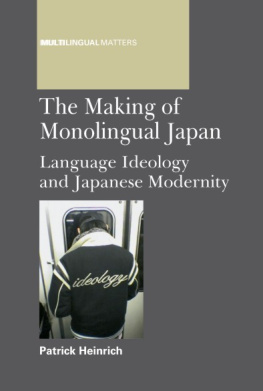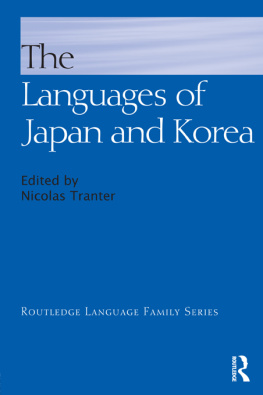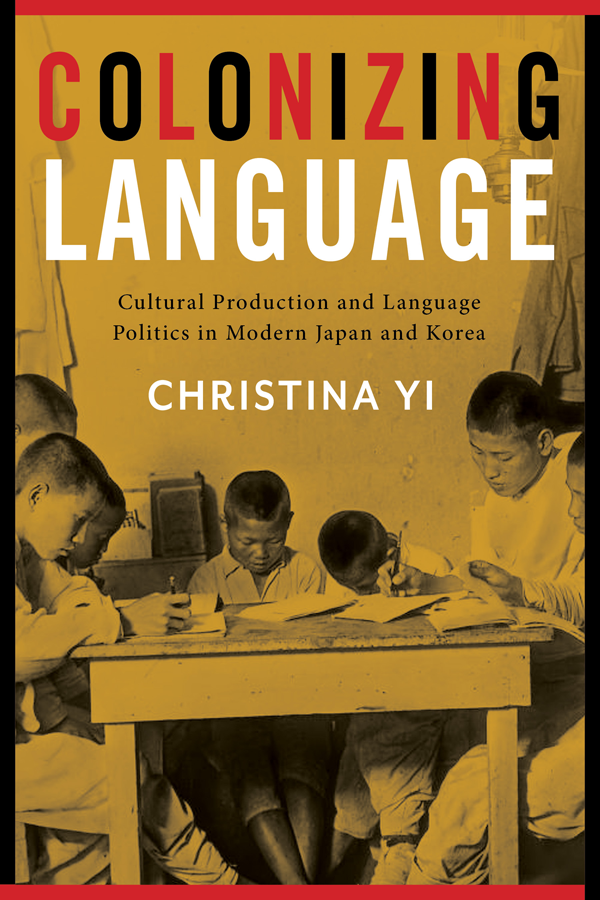Contents
Guide
Pagebreaks of the print version
COLONIZING LANGUAGE
A CENTER FOR KOREAN RESEARCH BOOK
CHRISTINA YI
COLONIZING LANGUAGE
Cultural Production and Language Politics in Modern Japan and Korea
Columbia University Press / New York
This work was supported by the Core University Program for Korean Studies through the Ministry of Education of the Republic of the Korea and the Korean Studies Promotion Service of the Academy of Korean Studies (AKS-2016-OLU-2250006).
Columbia University Press also wishes to express its appreciation for assistance given by Waseda University toward the cost of publishing this book.

Columbia University Press
Publishers Since 1893
New York Chichester, West Sussex
cup.columbia.edu
Copyright 2018 Columbia University Press
All rights reserved
E-ISBN 978-0-231-54536-5
Library of Congress Cataloging-in-Publication Data
Names: Yi, Christina, author.
Title: Colonizing language : cultural production and language politics in modern Japan and Korea / Christina Yi.
Description: New York : Columbia University Press, [2018] | Includes bibliographical references and index.
Identifiers: LCCN 2017029656 | ISBN 9780231184205 (cloth : acid-free paper)
Subjects: LCSH: Language policyEast Asia. | Language and cultureEast Asia.
Classification: LCC P119.32.E18 Y4 2018 | DDC 306.44/95dc23
LC record available at https://lccn.loc.gov/2017029656
A Columbia University Press E-book.
CUP would be pleased to hear about your reading experience with this e-book at .
Cover design : Noah Arlow
CONTENTS
A fter what feels like innumerable years toiling over the writing of this book, I have finally arrived at the most humblingbut also the most pleasurableof tasks: acknowledging the many individuals who made this book possible, although there is a risk I may run out of superlatives in doing so. I count myself fortunate for the community I found at Columbia University, beginning first and foremost with Tomi Suzuki and Theodore Hughes. Their tireless dedication, mentorship, and generosity easily outstrip any and all qualitative adjectives I could write here, and I confess I continue to rely upon their guidance. The same can be said of Haruo Shirane, whose always-practical advice has helped me reach the finish line and beyond. Paul Anderer pushed my research interests in exciting new directions and constantly challenged me to rethink the boundaries of my own assumptions. Special thanks, too, to Serk-Bae Suh, who continues to be a great source of support.
I spent two years conducting research at Waseda University as a graduate student and returned to Waseda some years later (this time as an assistant professor) to write this book manuscript. Both stays were made possible through the sponsorship of Professor Toeda Hirokazu, who has always been unstinting with his time, knowledge, and encouragement. I am also deeply grateful to him for inviting me to join his Japanese Literary and Cultural Reinvention Project and facilitating the publication of this book through a subvention from Waseda University. If there is anyone who deserves to be thought of as an onshi , with all that words most positive connotations, it is he!
I have been fortunate to learn from many other scholars from Japan and Korea, including Lee Sungsi, Lee Yeounsuk, Ko Youngran, Mori Rie, Munakata Kazushige, Sakakibara Richi, Suh Kyungsik, Tanaka Yukari, Toba Koji, Tsuboi Hideto, Unoda Shoya, and Watanabe Naoki. Kwak HyoungDuck, Shiono Kaori, and Tokinoya Yuri were three friends and colleagues who helped make my time in Japan not only productive but fun. I would like to extend an additional thank-you to Yuri as well as to Seung-Min Lee, Hiroaki Matsusaka, and Mariko Takano for their invaluable research assistance during my time at Waseda.
I have been doubly fortunate to work for a strong and supportive department at the University of British Columbia (UBC). Sharalyn Orbaugh has been a mentor to me since day one, in every possible way: with research, career development, teaching, student advising, and more. She also generously read portions of this manuscript in its various iterations, even in its roughest and most embarrassing state. Ross King and Christina Laffin likewise read portions of the manuscript and offered invaluable advice on the publishing process. I would like to particularly thank my other Japanese and Korean studies colleagues for their encouragement, including Don Baker, Stefania Burk, Rebecca Chau, Bruce Fulton, Nam-lin Hur, Jessica Main, Joshua Mostow, and Peter Nosco. I have also benefited from many rich discussions with students at UBC, at both the undergraduate and graduate level. Akiko Hirao, Shota Iwasaki, and Cyrus Qiu all worked as my research assistants at various times over the past three years; this book could not have been completed without their help.
I have had the great pleasure of presenting portions of my research at the University of Chicago, Hitotsubashi University, the University of Hong Kong, Lehigh University, Osaka University, Queens College, SUNY New Paltz, the University of California, Los Angeles, the University of Virginia, the University of Washington, and Waseda University; a sincere thank-you to the colleagues and students at these institutions for the feedback. I am also grateful to Michael Bourdaghs, Hyaeweol Choi, Hirata Yumi, Hirose Yoichi, Ted Mack, Mariko Tamanoi, and Bob Tierney for their insightful discussant comments, all of which have enriched my work. Michiko Wilson, who was one of the first professors to invite me to give a talk, actually taught me Japanese literature when I was an undergraduate at the University of Virginia; she and Stefania Burk were the ones who first suggested I consider graduate school, and so in a way I owe them more than anyone. Jim Fujita, meanwhile, is the one who first set me on what has turned out to be a lifelong path of language learning.
Many, many thanks to other friends and colleagues who also provided support, whether it was agreeing to read portions of a chapter or answering one of my thousands of questions regarding research and publication or providing me with delicious food (the best kind of support there is) or so on. This includes SeHyoun Ahn, Deokhyo Choi, Eun Jeong Choi, Nathen Clerici, Pau Pitarch Fernndez, Jon Glade, Andre Haag, Eric Han, Nan Ma Hartmann, Nathaniel Heneghan, Reto Hofmann, Claire Hope, Brendan Jinnohara, Yumi Kim, Selma and Shih-wei Kraft, Lopold Lambert, Alex Lee, Nancy Li, John Lie, Daniel Poch, Catherine Ryu, Ginny Schneider, Mi-Ryong Shim, Satoko Shimazaki, Ji Young Shin, Nate Shockey, Ariel Stilerman, Shiho Takai, Cindi Textor, Nobuko Yamasaki, Hitomi Yoshio, and Jin Yu.
Early stages of this project were made possible through generous research funding and administrative assistance from the Japan Foundation; the Social Science Research Council; the Waseda University 125th Anniversary Commemorative Junior Visiting Researcher Fellowship; the Weatherhead East Asian Institute; and the Department of East Asian Languages and Cultures, Columbia University. More recently, grants from the Northeast Asia Council of the Association of Asian Studies, the Peter Wall Institute at the University of British Columbia, the Japan Society for the Promotion of Science, and the Social Sciences and Humanities Research Council allowed me to conduct further research and writing.
Small portions of the historical context provided in the introduction and first chapter of this book appeared in a different version in National Language, Imperialization, and the Gendered Aporia of Empire, positions 24, no. 4 (2016): 81337. An earlier version of was originally published under the title Decadence, Double Agents, and a Drunken Boat: Colonial Legacies in Tanaka Hidemitsus Yoidorebune in the Proceedings for the Association of Japanese Literary Studies 17 (Summer 2016): 1019.


